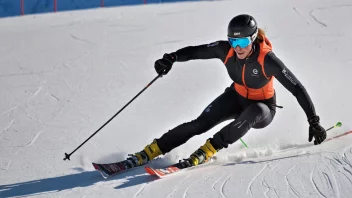In the world of competitive sports, physical prowess is only part of the equation. Mental fortitude plays a crucial role in an athlete's performance, especially during high-stakes situations. Whether you are a cyclist speeding down a mountain, a football player aiming for the end zone, or a skier navigating treacherous slopes, your mental state can influence your ability to perform at your best. This article explores various techniques and strategies to train your mind for competitive events, enhancing your performance while ensuring your safety.
The Importance of Mental Training
Just as athletes dedicate hours to perfecting their physical skills, mental training is equally essential. Mental resilience helps athletes cope with pressure, maintain focus, and recover from setbacks. Training the mind can lead to improved decision-making and increased confidence, both vital components during a competition.
Understanding Mental Toughness
Mental toughness is the ability to stay calm and focused under pressure. It involves not just the capacity to endure stressful conditions but also to thrive in them. Athletes with high mental toughness can push through discomfort, maintain motivation, and recover quickly from mistakes. Developing mental toughness can include setting specific goals, visualizing success, and employing positive self-talk.
Visualization Techniques
Visualization is a powerful method athletes can use to enhance performance. By mentally rehearsing actions and scenarios, athletes can prepare their minds for competition. Visualization should be detailed, involving all senses to create a vivid mental image. For instance, a cyclist may visualize themselves navigating a challenging course, feeling the wind against their face, and hearing the sounds around them. This technique not only improves confidence but also helps to solidify muscle memory.
Steps to Effective Visualization
- Find a Quiet Space: Choose a comfortable and quiet environment where you can concentrate.
- Close Your Eyes: Close your eyes and take deep breaths to relax your body and mind.
- Imagine the Scenario: Picture yourself in a competitive situation, focusing on every detail.
- Engage All Senses: Incorporate sounds, smells, and sensations to make the experience realistic.
- Practice Regularly: Make visualization a regular part of your training routine, ideally daily.
Mindfulness and Focus
Mindfulness involves being present in the moment and fully aware of your thoughts and feelings. This practice can help athletes maintain focus during competitions and reduce anxiety. By learning to let go of distractions, athletes can enhance their concentration, which is crucial in high-pressure situations.
Practicing Mindfulness
Here are some techniques to incorporate mindfulness into your training:
- Meditation: Spend a few minutes each day meditating to calm the mind and enhance focus.
- Breathing Exercises: Focus on your breath to anchor your mind and reduce anxiety.
- Body Scanning: Conduct a mental scan of your body to become aware of tension and relaxation.
- Engaging in Routine: Use routine and ritual before competition to enhance focus and reduce nerves.
Positive Self-Talk
The way athletes talk to themselves can significantly impact their performance. Positive self-talk promotes confidence and helps combat negative thoughts. Instead of dwelling on past mistakes or anticipating failure, athletes should focus on their strengths and visualize positive outcomes.
Techniques for Positive Self-Talk
To develop positive self-talk, consider the following strategies:
- Affirmations: Create and repeat positive affirmations that resonate with your goals.
- Challenge Negative Thoughts: Identify negative thoughts and reframe them into positive statements.
- Set Realistic Goals: Set achievable goals to foster a positive mindset and self-belief.
Setting Goals and Tracking Progress
Goal setting is an essential part of mental training. Establishing clear, measurable, and attainable goals provides a roadmap for athletes. Goals should encompass both short-term objectives and long-term aspirations. Tracking progress not only keeps athletes motivated but also allows them to assess their mental development.
Effective Goal-Setting Techniques
Here are some recommended strategies for effective goal-setting:
- SMART Goals: Ensure your goals are Specific, Measurable, Achievable, Relevant, and Time-bound.
- Break it Down: Divide larger goals into smaller, manageable objectives.
- Reflect and Adjust: Regularly assess progress and adjust goals as necessary.
Developing a Pre-Competition Routine
A well-structured pre-competition routine can help athletes mentally prepare for their events. This routine should include physical warm-ups, mental exercises, and visualization practices. Establishing a consistent routine can create a sense of familiarity and control, reducing anxiety and improving focus.
Components of a Pre-Competition Routine
Your pre-competition routine can include:
- Warm-up Exercises: Engage in physical warm-ups to prepare your body.
- Mental Rehearsal: Visualize your performance and go through critical moments in your mind.
- Positive Affirmations: Recite affirmations to boost confidence before competing.
Summary
Training your mind for competitive events is a multifaceted process that requires dedication and practice. By focusing on mental toughness, visualization, mindfulness, positive self-talk, and goal-setting, athletes can significantly improve their performance while ensuring their safety. Remember, the mind is a powerful tool; harness it effectively, and you will not only compete better but also find greater enjoyment in your athletic pursuits.






